|
|
|
Sort Order |
|
|
|
Items / Page
|
|
|
|
|
|
|
| Srl | Item |
| 1 |
ID:
128265
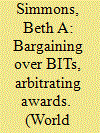

|
|
|
|
|
| Publication |
2014.
|
| Summary/Abstract |
The regime for international investment is extraordinary in public international law and controversial in many regions of the world. This article explores two aspects of this set of rules: its decentralization and the unusual powers it gives to private actors to invoke dispute settlement. Decentralization has contributed to a competitive environment for ratification of bilateral investment treaties (BITs) and has elevated the importance of dyadic bargaining power in the formation of the regime. Governments of developing countries are more likely to enter into BITs and tie their hands more tightly when they are in a weak bargaining position, which in turn is associated with economic downturns of the domestic economy. Once committed, investors have sued governments with surprising regularity, arguably contributing disproportionately to legal awards that favor the private corporate actors who have the power to convene the dispute settlement system. States have begun to push back, revising their obligations and attempting to annul arbitral awards. One of the conclusions is that it is important not only to consider whether BITs attract capital-which has been the focus of nearly all the empirical research on BIT effects-but also to investigate the governance consequences of the international investment regime generally.
|
|
|
|
|
|
|
|
|
|
|
|
|
|
|
|
| 2 |
ID:
132508
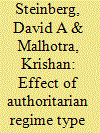

|
|
|
|
|
| Publication |
2014.
|
| Summary/Abstract |
Conventional wisdom holds that autocracies are more likely than democracies to adopt interventionist and protectionist economic policies, including fixed and undervalued exchange rates. This article suggests that this view is only partially correct: nondemocracies are a heterogeneous grouping, and only some types of authoritarian regimes adopt different foreign economic policies from those of their democratic counterparts. Using the example of exchange rate policy, the authors show that foreign economic policy varies across monarchic, military, and civilian dictatorships. More specifically, they hypothesize that monarchies and military regimes are more likely than democracies and civilian dictatorships to maintain fixed exchange rate regimes because the former regimes have smaller "selectorates" than the latter. The authors also expect that monarchies and civilian dictatorships maintain more undervalued exchange rates than democracies and military regimes because the former regimes provide their leaders with greater tenure security than the latter regimes. These hypotheses are evaluated using a time-series-cross-sectional data set of a large sample of developing countries from 1973 to 2006. The statistical results accord with these predictions. These findings indicate that the ways in which democracies engage with the global economy may be less unique than many believe.
|
|
|
|
|
|
|
|
|
|
|
|
|
|
|
|
| 3 |
ID:
129637


|
|
|
|
|
| Publication |
2014.
|
| Summary/Abstract |
The global financial crisis (GFC) and subsequent Eurozone sovereign debt crisis (ESDC) have made reform of the global financial governance regime a priority for governments around the world. Prior to the crisis, neoliberal policies agreed between the European Union and the USA created a financial governance regime based on the principle of free operation of the market through the norms of market self-regulation, equal access to the market, and stability via institutional supervision. How will global financial governance look like after these crises? And what role can the EU and China play in shaping this regime? This article argues that as a result of the GFC and the ESDC, stability is becoming a second principle of global financial governance, along with the free operation of the market. Meanwhile, European and Chinese views regarding the norms, rules, and decision-making procedures designed to implement those principles do not differ as much as they used to. Thanks to interactions at the bilateral and multilateral levels, the EU and China now have knowledge regarding how the other understands the role and characteristics that financial governance should have. This is leading to convergence in some areas and cooperation in others. Concurrently, there are also areas of competition. Analysing all of these is essential to understand how global financial governance might evolve, given the central role that the EU and China now play in this regime.
|
|
|
|
|
|
|
|
|
|
|
|
|
|
|
|
| 4 |
ID:
128266


|
|
|
|
|
| Publication |
2014.
|
| Summary/Abstract |
Although many features of bilateral investment treaties (BITs) are consistent from one agreement to the next, a closer look reveals that the treaties exhibit considerable variation in terms of their enforcement provisions, which legal scholars have singled out as the central component of the treaties. An original data set is compiled that captures three important treaty-design differences: whether the parties consent in advance to international arbitration, whether they allow treaty obligations to be enforced before an institutionalized arbitration body, and how many arbitration options are specified for enforcement. Drawing upon several relevant literatures on international institutions, three potentially generalizable explanations for this important treaty variation are articulated and tested. The strongest support is found for the theoretical perspective that emphasizes the bargaining power and preferences of capital-exporting states, which use the treaties to codify strong, credible investor protections in all their treaties. Empirical tests consistently reveal that treaties contain strong enforcement provisions-in which the parties preconsent to multiple, often institutionalized arbitration options-when the capital-exporting treaty partner has considerable bargaining power and contains domestic actors that prefer such arrangements, such as large multinational corporations or right-wing governments. In contrast, there is no evidence to support the popular hands-tying explanation, which predicts that investment-seeking states with the most severe credibility problems, due to poor reputations or weak domestic institutions, will bind themselves to treaties with stronger investment protections. likewise, little support is found for explanations derived from the project on the rational design of international institutions, which discounts the identities and preferences of the treaty partners and instead emphasizes the structural conditions they jointly face. In sum, this foundational study of differences across investment treaties suggests that the design of treaties is driven by powerful states, which include elements in the treaties that serve their interests, regardless of the treaty partner or the current strategic setting.
|
|
|
|
|
|
|
|
|
|
|
|
|
|
|
|
| 5 |
ID:
128267
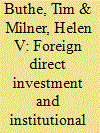

|
|
|
|
|
| Publication |
2014.
|
| Summary/Abstract |
International trade agreements lead to more foreign direct investment (FDI) in developing countries. This article examines the causal mechanisms underpinning this trade-investment linkage by asking whether institutional features of preferential trade agreements (PTAs), which allow governments to make more credible commitments to protect foreign investments, indeed result in greater FDI. The authors explore three institutional differences. First, they examine whether PTAs that have entered into force lead to greater FDI than PTAs that have merely been negotiated and signed, since only the former constitute a binding commitment under international law. Second, they ask whether trade agreements that have investment clauses lead to greater FDI. Third, they consider whether PTAs with dispute-settlement mechanisms lead to greater FDI. Analyses of FDI flows into 122 developing countries from 1971 to 2007 show that trade agreements that include stronger mechanisms for credible commitment induce more FDI. Institutional diversity in international agreements matters.
|
|
|
|
|
|
|
|
|
|
|
|
|
|
|
|
| 6 |
ID:
131515
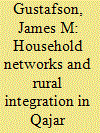

|
|
|
|
|
| Publication |
2014.
|
| Summary/Abstract |
The governorships of Muhammad Isma?il Khan Vakil al-Mulk (1859-68) and Murtaza Quli Khan Vakil al-Mulk II (1868-78) in Qajar Kirman were highlighted by an extensive building campaign which initiated a period of significant social and economic change in the province. This article explores the activities of local elites in managing their family estates in the context of this project through a careful analysis of provincial geographical and historical writings, Persian-language travelogues, and commentary by European administrators and travelers. Kirmani elites began investing in land and commercial agriculture on an unprecedented scale, accelerating Kirman's absorption into global economic patterns as a producer of raw materials like cotton, wool, and opium. An integrated political economy developed regionally through the expanding networks of elite households and their estates, reinforced by families combining landownership with administrative functions in rural areas. This process demonstrates the extent to which Iranians were active participants in transforming their communities in the context of the advance of global capitalism, with longstanding patterns of elite household competition playing an important role in mediating social and political change locally.
|
|
|
|
|
|
|
|
|
|
|
|
|
|
|
|
| 7 |
ID:
129094
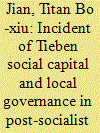

|
|
|
|
|
| Publication |
2014.
|
| Summary/Abstract |
This study makes use of the framework of social capital to explain the post-socialist governance model and characteristics of local governments in contemporary China. The incident of Tieben in April 2004 is selected as an example to explain how the local government developed social capital using informal mechanism and policy networks to facilitate economic development and to enhance government performance. thereby forming the so-called post-socialist local regime. During the incident of Tieben. the local movement collaborated with real estate developers and financial institutions. Farmers were excluded from this plan and their interests were sacri?ced. This study uses the concept of bonding social capital to explain this model. The model worked on the basis of the close relationship between specific groups rather than general trust and ptiblic participation. The majority of relevant sttitlies. on the other hated. show that instead of bonding social capital. bridging social capital is a better means to resolve the conflicts among nunicrous stib-grotips with vested interests. and to facilitate favorable economic and social performance. This paper hence contends that. although a local government may stimulate the development of social capital. the use of this governance model excites the participation and deprives cannot provide a useful guide for optimizing local government performance.
|
|
|
|
|
|
|
|
|
|
|
|
|
|
|
|
| 8 |
ID:
128264
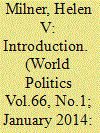

|
|
|
|
|
| Publication |
2014.
|
| Summary/Abstract |
The world economy has maintained or enhanced its integration in the past decade even in the face of the global financial crisis. A large part of this globalization has been driven by capital flows. This symposium focuses on one element of these capital flows, foreign direct investment (FDI), and on the regime in place to safeguard and promote such investments around the globe. The articles by Allee and Peinhardt and Simmons focus on the nature and evolution of the bilateral investment treaties (BITs) that have been developed to protect such investments and that have proliferated since the 1990s. The final article, by Büthe and Milner, turns its attention to the ways in which international trade agreements affect FDI. The comparison between the investment and trade agreements is instructive, since they seem to have different effects.
FDI has become one of the most important economic flows in the global economy. It is a critical source of capital for developing countries and remains a significant source of investment in the developed world. FDI has grown in part because countries changed their policies toward it dramatically after the 1980s; governments in developing countries made unilateral policy changes that opened up markets across the globe and increased competition among countries for FDI.
|
|
|
|
|
|
|
|
|
|
|
|
|
|
|
|
| 9 |
ID:
130995
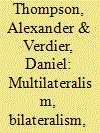

|
|
|
|
|
| Publication |
2014.
|
| Summary/Abstract |
Different international regimes are built from legal instruments that vary in terms of whether they are multilateral, bilateral, or a combination thereof. We investigate the reasons for such variation. The choice between multilateralism and bilateralism is a function of the tradeoff between each instrument's relative flaw. Multilateralism is wasteful in incentives, as the same agreement is offered to all states regardless of their compliance costs. Bilateralism mitigates this problem by allowing for more tailored agreements but in the process multiplies transaction costs by requiring many of them. We use a formal model to generate propositions on the design of "lateralism" and the related issue of membership size and offer illustrations in the context of four regimes: foreign direct investment, human rights, climate change, and international trade.
|
|
|
|
|
|
|
|
|
|
|
|
|
|
|
|
| 10 |
ID:
131708
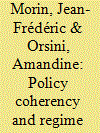

|
|
|
|
|
| Publication |
2014.
|
| Summary/Abstract |
This study argues that 'regime complexes' and 'policy coherence' are two faces of the same integrative process. The development of regime complexes co-evolves with the pressures on decision makers to coordinate their policies in various issue-areas. Conceptually, we introduce a typology of policy coherency (erratic, strategic, functionalistic, and systemic) according to its procedural and substantive components. Empirically, by triangulating quantitative and qualitative data, we use this typology for the case of the genetic resources' regime complex to illustrate the links between regime complexes and policy coherency. Our results suggest that a coherent policymaking process favours integrated regime complexes, while greater exposure to a regime complex increases the pressure to have a coherent policymaking. This study fills a gap in the literature on regime complexes by providing a micro-macro model linking structure to agency.
|
|
|
|
|
|
|
|
|
|
|
|
|
|
|
|
| 11 |
ID:
129098
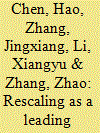

|
|
|
|
|
| Publication |
2014.
|
| Summary/Abstract |
it is worthwhile to empirically probe the prominent value of the transformation process by employing the state rescaling perspective. However, the stated rescaling, as an important theoretical discourses, that not been s_\ stoically scrutinized in Chinese context. In this article. the empirical lrainexxorlx based on the central state--led regional planning and its changes is established and implemented to unfold the solution
tra_iector} of China's six state scaling stages since 1953. In the mean- time. it is argued that China's state rescaling is not resulted from o\enroll socioeconomic tt'ansforination. hut plays a role as the leading project. theoretical . it could he concluded that state rescaling in China is neither the product of internal 'natural economic process' nor the consequence triggered have the globalization. hut the outcome or" the state's politic political selection.
|
|
|
|
|
|
|
|
|
|
|
|
|
|
|
|
| 12 |
ID:
131005
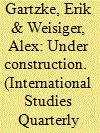

|
|
|
|
|
| Publication |
2014.
|
| Summary/Abstract |
The widely documented dyadic democratic peace observation has led to optimism that the spread of democracy might prove pacifying even outside of democratic dyads. Yet, tensions between the logic of liberal peace in dyads and systems suggest that economic development may be better suited than democracy as a determinant of systemic liberal peace. In particular, regime type heterogeneity (difference) stands to increase conflict at the system level. We argue that there exists a systemic developmental peace, in which increased wealth encourages powerful developed nations to discourage other countries from fighting, even as these same developed states continue to use force in service of their own private objectives. We also separate out the effects of aggregate democracy from regime type difference in our analysis. Systemic and cross-level statistical tests support the following propositions: greater systemic development encourages peace, difference propagates war, and increased systemic democracy has no consistent impact on interstate conflict.
|
|
|
|
|
|
|
|
|
|
|
|
|
|
|
|
| 13 |
ID:
130852
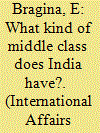

|
|
|
|
|
| Publication |
2014.
|
| Summary/Abstract |
The article examines economic conditions in India and that country's middle class. Conflicting estimates of the population of India's middle class are cited as an indication of the difficulty in estimating economic indicators in developing countries due to the large informal sector of their economies. Economic and social indicators for India including its large percentage of younger adults, urbanization and consumption suggesting India's middle class will increase in size are discussed.
|
|
|
|
|
|
|
|
|
|
|
|
|
|
|
|
|
|
|
|
|